O donna, ne ni n'jarabi de kèlèla, O donna
O donna, ne ni n'furunyògòn de kèlèla, O donna
A y'i ban k'i bolo da ne kan na
A y'i ban k'i bolo da cèkisè la
A y'i ban k'i bolo da ne kun na
A y'i ban ki nyè jò ne nyè la
Ne dusu kolo bè n'diminna
N'ko ne dun bè n'jarabi fè
Ne dun bè n'kanu fè
N‟ko ne dun bè n'jarabi fè
Ne dun bè n'kanu kò
Hodounannnnyeeeee Hodounannnn
A y’i ban k’i bolo da ne kan na
A y’i ban k’i bolo da cèkisè la
A y’i ban k’i bolo da ne sin kan
A y’i ban k’i bolo da kunkolo la
Ne dusu kolo bè n’diminna
N’ko ne dun bè n'jarabi fè
Ne dun bè n’kanu kò
N’ko ne dun bè n' jarabi fè
Ne dun bè n’kanu kò
Hodounannnnyeeeee Hodounannnn
Hodounannnnyeeeee
A y’i ban k’i bolo da ne sin kan
A y’i ban k’i bolo da cèkisè la
A y’i ban k’i bolo da ne kun na
A y’i ban k’i bolo da ne kan na
A y’i ban k’i bolo da ne bolo kan
A y’i ban k’i bolo da cèkisè la
A y’i ban k’i bolo da ne kun na
A y’i ban k’i bolo da ne bolo kan
A y’i ban k’i bolo da ne sen ka
A y’i ban k’i bolo da cèkisè la
A y’i ban k’i bolo da kunkolo la
A y’i ban k’i bolo da ne sin kan
O donna, ne ni n'furunyògòn de kèlèla, O donna
A y'i ban k'i bolo da ne kan na
A y'i ban k'i bolo da cèkisè la
A y'i ban k'i bolo da ne kun na
A y'i ban ki nyè jò ne nyè la
Ne dusu kolo bè n'diminna
N'ko ne dun bè n'jarabi fè
Ne dun bè n'kanu fè
N‟ko ne dun bè n'jarabi fè
Ne dun bè n'kanu kò
Hodounannnnyeeeee Hodounannnn
A y’i ban k’i bolo da ne kan na
A y’i ban k’i bolo da cèkisè la
A y’i ban k’i bolo da ne sin kan
A y’i ban k’i bolo da kunkolo la
Ne dusu kolo bè n’diminna
N’ko ne dun bè n'jarabi fè
Ne dun bè n’kanu kò
N’ko ne dun bè n' jarabi fè
Ne dun bè n’kanu kò
Hodounannnnyeeeee Hodounannnn
Hodounannnnyeeeee
A y’i ban k’i bolo da ne sin kan
A y’i ban k’i bolo da cèkisè la
A y’i ban k’i bolo da ne kun na
A y’i ban k’i bolo da ne kan na
A y’i ban k’i bolo da ne bolo kan
A y’i ban k’i bolo da cèkisè la
A y’i ban k’i bolo da ne kun na
A y’i ban k’i bolo da ne bolo kan
A y’i ban k’i bolo da ne sen ka
A y’i ban k’i bolo da cèkisè la
A y’i ban k’i bolo da kunkolo la
A y’i ban k’i bolo da ne sin kan
inviata da Krzysiek - 26/12/2016 - 03:05
Lingua: Inglese
LOVE
The other day I argued with my love
The other day I argued with my husband and now...
His hands no longer touch my neck
His hands no longer touch my waist
His hands no longer stroke my hair
He no longer looks me in the eye
And my heart aches
I love him so!
I love my darling so much!
I love him so!
I will always follow my love
Hodounanye hodounan
His hands no longer touch my neck
His hands no longer touch my waist
His hands no longer touch my breasts
He no longer caresses my face
And my heart aches
I love him so!
I love my darling so much!
I love him so!
I will always follow my love
Hodounanye hodounan
The other day I argued with my love
The other day I argued with my husband and now...
His hands no longer touch my neck
His hands no longer touch my waist
His hands no longer stroke my hair
He no longer looks me in the eye
And my heart aches
I love him so!
I love my darling so much!
I love him so!
I will always follow my love
Hodounanye hodounan
His hands no longer touch my neck
His hands no longer touch my waist
His hands no longer touch my breasts
He no longer caresses my face
And my heart aches
I love him so!
I love my darling so much!
I love him so!
I will always follow my love
Hodounanye hodounan
inviata da Krzysiek - 26/12/2016 - 03:07
Lingua: Francese
Traduzione francese dal sito ufficiale
AMOUR
L’autre jour je me suis disputée avec mon bien aimé
L’autre jour je me suis disputée avec mon époux
Et maintenant…
Ses mains ne touchent plus mon cou
Ses mains ne touchent plus ma taille
Ses mains ne caressent plus mes cheveux
Il ne me regarde plus dans les yeux
Et j’ai si mal au cœur
Je l’aime tellement, mon amour
Qu’est-ce que je l’aime!
Je l’aime tellement, mon amour
Je suivrai toujours mon amour
Ses mains ne touchent plus mon cou
Ses mains ne touchent plus ma taille
Ses mains ne caressent plus mes seins
Ses mains ne caressent plus ma tête
Et j’ai si mal au cœur
Je l’aime tellement, mon amour
Je suivrai toujours mon amour
Je l’aime tellement, mon amour
Je suivrai toujours mon amour
L’autre jour je me suis disputée avec mon bien aimé
L’autre jour je me suis disputée avec mon époux
Et maintenant…
Ses mains ne touchent plus mon cou
Ses mains ne touchent plus ma taille
Ses mains ne caressent plus mes cheveux
Il ne me regarde plus dans les yeux
Et j’ai si mal au cœur
Je l’aime tellement, mon amour
Qu’est-ce que je l’aime!
Je l’aime tellement, mon amour
Je suivrai toujours mon amour
Ses mains ne touchent plus mon cou
Ses mains ne touchent plus ma taille
Ses mains ne caressent plus mes seins
Ses mains ne caressent plus ma tête
Et j’ai si mal au cœur
Je l’aime tellement, mon amour
Je suivrai toujours mon amour
Je l’aime tellement, mon amour
Je suivrai toujours mon amour
Lingua: Italiano
Traduzione italiana di Paolo Muccio da YT
AMORE
L'altro giorno
ho litigato con
il mio amore
L'altro giorno
ho litigato con
il mio uomo
E adesso...
Le sue mani
non sfiorano
più il mio collo
Le sue mani
non afferrano
più il mio bacino
Le sue mani
non accarezzano
più i miei capelli
I suoi occhi
non si perdono più
nei miei occhi
Ed il mio cuore
soffre per questo
Lo amo tanto
Ti amo tanto
Continuerò
a seguire
il mio cuore
L'altro giorno
ho litigato con
il mio amore
L'altro giorno
ho litigato con
il mio uomo
E adesso...
Le sue mani
non sfiorano
più il mio collo
Le sue mani
non afferrano
più il mio bacino
Le sue mani
non accarezzano
più i miei capelli
I suoi occhi
non si perdono più
nei miei occhi
Ed il mio cuore
soffre per questo
Lo amo tanto
Ti amo tanto
Continuerò
a seguire
il mio cuore
inviata da Krzysiek - 16/10/2017 - 22:56
Lingua: Polacco
Traduzione polacca dalla traduzione italiana
Di Krzysiek Wrona
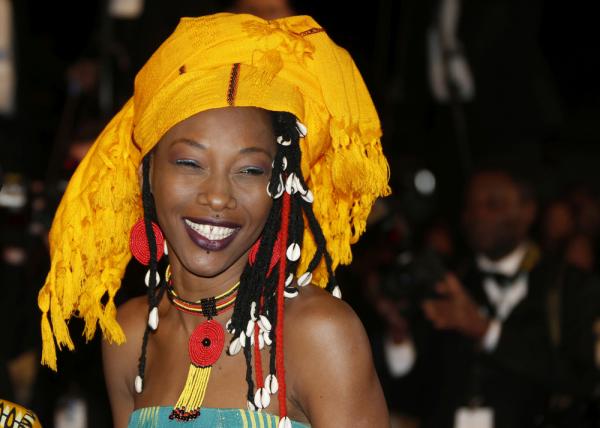
https://www.youtube.com/watch?v=DaZT3I3Zd1Q
Di Krzysiek Wrona

https://www.youtube.com/watch?v=DaZT3I3Zd1Q
KOCHANIE
Pewnego dnia
Pokłóciłam się
Ze swoim ukochanym
Pewnego dnia
Pokłóciłam się
Ze swoim ukochanym
I teraz
Jego ręce
Nie pieszczą już
Mojej szyi
Jego ręce
Nie ściskają już
Moich bioder
Jego ręce
Nie gładzą już
Moich włosów
Jego oczy
Nie toną już
W moich
A moje serce
Pękło
Tak bardzo Cię miłuję
I będę już zawsze
Słuchać
Mego serca
Pewnego dnia
Pokłóciłam się
Ze swoim ukochanym
Pewnego dnia
Pokłóciłam się
Ze swoim ukochanym
I teraz
Jego ręce
Nie pieszczą już
Mojej szyi
Jego ręce
Nie ściskają już
Moich bioder
Jego ręce
Nie gładzą już
Moich włosów
Jego oczy
Nie toną już
W moich
A moje serce
Pękło
Tak bardzo Cię miłuję
I będę już zawsze
Słuchać
Mego serca
inviata da Krzysiek Wrona - 22/10/2017 - 02:25
c'è un problema sulla pagina di questa canzone. Le parole sono quelle di Kanou ma la traduzione è quella di Sowa, che è un'altra canzone di Fatoumata Diawara. C'è da capire se l'interpretazione di Krzys si riferisse a questa canzone all'altra. Penso che l'errore derivi da lyrics translate dove la traduzione è inserita sotto il titolo sbagliato.
Lorenzo - 14/10/2017 - 21:40
ah no penso che sia sbagliato nel sito ufficiale (in francese sono invertite le traduzioni?). Ora cerco meglio...
no penso che sia giusto e sul sito ufficiale abbiano scambiato le traduzioni perché secondo questo dizionario Kanou, o kanu, vuol dire proprio "amore" in bambara.
Lorenzo - 14/10/2017 - 21:53
Ho fatto un esperimento: ho preso un verso qualsiasi della canzone e ho fatto una ricerca su Google. Come si può vedere, il verso è attribuito praticamente a casaccio tra "Kanou" e "Sowa". Salud!
Riccardo Venturi - 15/10/2017 - 07:49
però ascoltando la canzone le parole corrispondono a Kanou. C'è da capire se la traduzione sia della canzone giusta, ma credo di sì.
Lorenzo - 15/10/2017 - 10:55
Tutto l'equivoco parte probabilmente dal sito ufficiale dell'artista dove non solo vengono scambiati i testi di due canzoni, cioè "Kanou" e "Sowa", ma anche le rispettive traduzioni in inglese e francese sotto i testi originali.
http://www.fatoumatadiawara.com/parolessowa
http://www.fatoumatadiawara.com/lyricssowa
Sulla lingua Bamanankan (Bamabara) ho trovato solo questo:
https://bm.wikipedia.org/wiki/Bamanankan
https://wikitravel.org/en/Bambara_phra...
https://joshuaproject.net/languages/bam
Neanche un dizionario per essere certo che la parola "kanou" vuol dire "amore" in bambara, ma lo dice Fatoumata stessa:
Bisogna darle fiducia :)
Salud
http://www.fatoumatadiawara.com/parolessowa
http://www.fatoumatadiawara.com/lyricssowa
Sulla lingua Bamanankan (Bamabara) ho trovato solo questo:
https://bm.wikipedia.org/wiki/Bamanankan
https://wikitravel.org/en/Bambara_phra...
https://joshuaproject.net/languages/bam
Neanche un dizionario per essere certo che la parola "kanou" vuol dire "amore" in bambara, ma lo dice Fatoumata stessa:
Bisogna darle fiducia :)
Salud
Krzysiek - 16/10/2017 - 23:12
×
![]()

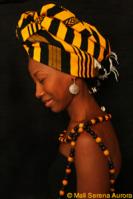
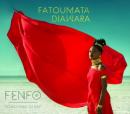


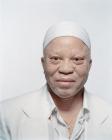
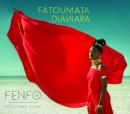

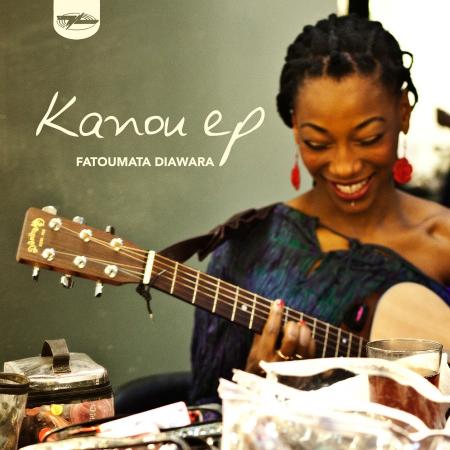
EP: Kanou
(Released)
"Pare che parla di una donna che ha perso il suo marito in guerra." [pKW]
The singer tells Susie Mesure why Friday's concert marking International Women's Day means so much
Susie Mesure
The Independent Online, Sunday 3 March 2013
Sung in her native Bambara, the words of Fatoumata Diawara's songs will be a mystery to most of the audience in London at next Friday night's concert. But the sentiment behind the Malian singer's lyrics will strike a chord far beyond those gathered on the South Bank for a concert to mark International Women's Day.
Sitting in a central London café, swaddled in a grey puffa coat, her thick cream scarf wrapped tight against the chill, Diawara explains: "We have to keep singing. Women need more motivation. We need to wake up women's consciences and say, 'Don't give up. Continue.'"
The Paris-based artist sees herself as an ambassador, a role she has relished since fleeing her native country for France 10 years ago, aged 20. From there, she has joined the handful of African singers known outside their continent. "We have only Angélique [Kidjo], Oumou [Sangaré], Miriam [Makeba]. That's because in Africa, we have many women who sing but it's very difficult to be a singer – to have musicians to support you, and respect you, and to have your husband support you; to have your freedom. Women need to be emancipated."
At 30, Diawara, who is married to an Italian, would like a baby. She relishes the choice, knowing that, had she stayed in Mali, that decision would not have been hers. "I should be married to my cousin if I'd stayed. Normally, in my family, at 15 you are married, at 15 you are a woman." By now, she'd have had nine children, and be "very, very, old".
Instead, she adds: "In Mali, my generation looks at me, at every action I do. I'm like a little example for them, for women. When I'm in Bamako, many girls come to me and say they're very happy for everything I'm doing. I can tell them what I want through my music."
And she does: with songs like "Boloko" that denounce female genital mutilation. Or "Sowa", her paean to children who grow up not knowing their parents, which was born of her own experience: banished at the age of 12 to live with an aunt, she says she didn't see her parents again until she was 26. The music, on her acclaimed debut album Fatou, is a haunting mix of beats from her ancestral Wassoulou region.
Diawara, who is tall and striking, the white cowrie shells dangling from her plaits contrasting against the black, knows she is lucky to be celebrating International Women's Day, a day that will pass like any other for most Malians. "We need someone like me to debate on TV what it means to be a woman today in Mali. We need more women emancipated to talk about that."
She is using her position to talk about far more than just women. In December, during a trip to Mali's capital, Bamako, Diawara rallied 40 fellow musicians to record a song calling for peace in their war-torn country. The seven-minute song, "Mali-ko" (Peace), urges unity to quash the Islamist fighters in the country's north. She says everyone in the country, which lives through its music, has heard the song, which features the blind husband-and-wife duo Amadou & Mariam, Oumou Sangaré, the kora player Toumani Diabaté, Bassekou Koyaté, plus Tiken Jah Fakoly from Ivory Coast.
"We ask for peace and unification to protect our cultural heritage. It was like a little gift to the Malian population. This song was to say, help, please. We needed help from around the world. If Malian artists have a fan club, the message was that our music is finishing. If you don't come tomorrow, nothing will be left."